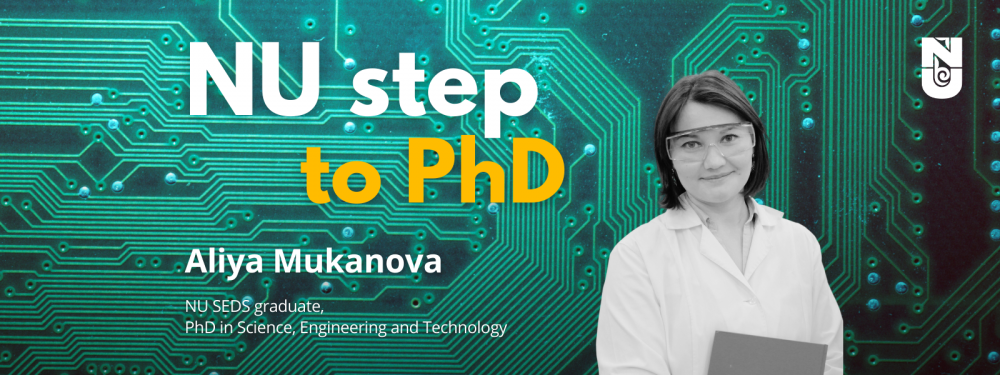NU Step to PhD: Aliya Mukanova, PhD in Science, Engineering, and Technology
Our next NU Step to PhD guest is Aliya Mukanova, an NU SEDS graduate, with a PhD in Science, Engineering, and Technology. Aliya is the winner of the “Leader of Science-2020” award from Clarivate. According to the Web of Science, articles published by Aliya were among the most cited in the world in 2020. At the moment, Dr. Mukanova works as a senior researcher at the NU National Laboratory Astana, and she is leading two projects funded by the Ministry of Education and Science of the Republic of Kazakhstan on the development of materials for lithium-ion and sodium-ion batteries.
Tell us about your doctoral research?
My PhD research was dedicated to the development of materials for micro-accumulators. Nowadays, microelectronics, medical implantable devices, wireless sensors, and various chips on cards are actively being developed, and they also need their own power source. In order to meet the energy requirements of these new devices, which require more stable and durable energy, it is necessary to develop improved materials for micro-accumulators.
The peculiarity of my work is that the research was conducted on thin films, the thickness of which was only a few tens of nanometers. In the course of my work, we managed to obtain a thin-film anode material that worked stably for about 500 cycles, with good capacity. The results of our research were published in foreign journals and patented.
What is the applied value of your work?
The application of the research is in the fact that the developed methods and materials can be used both for their initially intended purpose in micro accumulators and for adjacent areas where such materials can also be applied. The usage of improved materials always leads to the development of technology, and developed technology improves the quality of life of ordinary people. Moreover, the new data which was obtained on material сharateristics is very important for materials science in general.
What can you tell us about the process of writing your thesis?
In my case, the writing of the thesis was delayed and took place over five long years instead of the planned-for-three. The initially chosen topic of the dissertation was challenging for me. First of all, this study required a knowledge of chemistry and electrochemistry, and I am a physicist with a background in the nuclear field. Secondly, the topic of micro accumulators was completely new for me and my colleagues. No one in our group had the necessary skills to work with such materials, so we had to figure it out through trial-and-error methods which certainly are suitable for any experimental work but it made the process more lengthy.
I was lucky to work with my dissertation supervisor, Professor Zhumabai Bekbolatovich Bakenov, and by the time I arrived, his laboratory had all the necessary equipment for my research.
Please, tell us about your future plans.
It’s been two years since the defense of my dissertation. At the moment, I am a senior researcher at the National Laboratory Astana. I am leading two projects for the Ministry of Education and Science of the Republic of Kazakhstan. At the same time, I’m the co-director of Professor Bakenov’s new program. I like what I do, so in the future, I see myself as a scientist and also as a professor. My main driver is the desire to pass on my accumulated knowledge and make my contribution to the education of Kazakhstan’s future generation.
What would you advise to future doctoral students?
I wish for future doctoral students to be bold, proactive, and sometimes risky in their scientific research.


